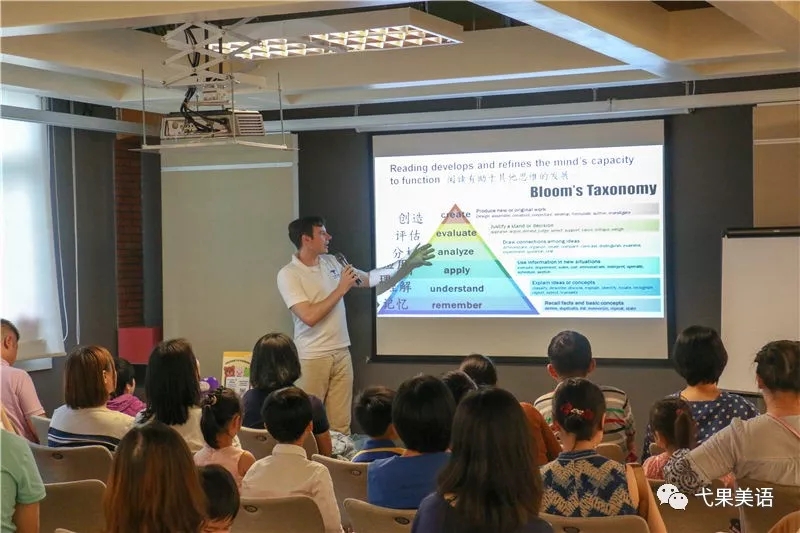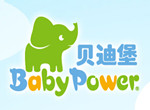【閱讀講座】趣味閱讀原來這么有用,爸媽們嘗試過了嗎?
上周末,由上海外文書店主辦弋果美語協(xié)辦的親子閱讀分享會順利舉行!現(xiàn)場近40組家庭齊聚,一起聽弋果美語Teacher Ben講述親子互動(dòng)的重要性、趣味閱讀的技巧,并現(xiàn)場分組實(shí)踐了老師的技巧。
錯(cuò)過了精彩講座?沒關(guān)系!
弋果小編為大家獻(xiàn)上
當(dāng)天的一些趣味閱讀知識!
Why Read?
為什么閱讀如此重要?這是很多爸爸媽媽們想要問的問題,他們其實(shí)知道閱讀重要,卻不明白到底能夠培養(yǎng)孩子哪些方面的能力。
Clark and Rumbold? show that reading for enjoyment? improves our whole-person well-being.
趣味閱讀讓我們活得更幸福。
(via.Clark and Rumbold 2006)
In providing an opportunity to take different perspectives andencouraging reflection on one's own behavior.
多角度思考、重視反思。
(via.Hurrelmann 1994; Spinner 1989)
In fostering responsible participation inpolitical, social, and cultural life.
增強(qiáng)責(zé)任感。
(via.Enquete-KommissionKultur in Deutschland 2007; Liebau 2007)

圖為Teacher Ben講述閱讀對思維發(fā)展的作用
趣味閱讀是閱讀中一種比較輕松愉快的方式,他讓閱讀變得不那么枯燥乏味,特別是針對幼兒和少兒階段的孩子,這種方式能夠讓他們更樂意閱讀、真正享受閱讀的樂趣。
A New Zealand study found that enjoyment of? reading “is a key indicator for engagement in learning and for competency levels at age 14.”
新西蘭一項(xiàng)研究表明,趣味閱讀可以在很大程度上說明14歲學(xué)生學(xué)習(xí)的積極性和學(xué)習(xí)能力。
(via.Rivers 2006 p.5)
It lists the combined academic, social and emotional benefits of reading for enjoyment, as follows:
趣味閱讀在學(xué)業(yè)、社交和情感上還有很多益處:
享受閱讀的學(xué)生
Higher scores on the cognitive and social / attitudinal competencies
認(rèn)知、社交水平都更好
Consistently higher scores in mathematics, reading, logical problem-solving and attitude
數(shù)學(xué)、閱讀、邏輯、解決問題的能力更優(yōu)
Higher average scores for engagement in school, positive communication and relations with family, and positive friendships
在校表現(xiàn)更佳、在人際交往、經(jīng)營親情友情上也表現(xiàn)更好
Less risky behaviour
更少冒險(xiǎn)行事
Higher levels of motivation towards school
對學(xué)校充滿動(dòng)力

圖為一位孕期家長在講座中的提問
趣味閱讀對學(xué)生的成長很有益處,而英語趣味閱讀則對培養(yǎng)孩子的英語能力有著更為重要的關(guān)鍵作用。
Parthasarathy and others in Hong Kong found that those that read in their spare time in English and Chinese had much higher oral and literacy skills than those who read less (2014).
在閑暇時(shí)間閱讀中英書籍的學(xué)生擁有更好的口語和讀寫能力.
趣味閱讀有益學(xué)生
Master text comprehension and the retrieval of written information ineveryday life.
增強(qiáng)對文本的理解力和回溯信息的能力。
(via.Schüller, E.M., Birnbaum, L., & Kr?ner, S. 2017)
Improve poor readers’ performances.
提高閱讀能力不強(qiáng)的學(xué)生的學(xué)習(xí)表現(xiàn)。
(via.Mol & Bus 2011)
Outperform peers in vocabulary development and reading achievementtests.
比起同齡人,詞匯量更大,閱讀能力更強(qiáng)。
(via.Cipielewski and Stanovich 1992; Nagy, Anderson, and Herman 1987)

圖為家長用Teacher Ben課堂講述技巧與孩子進(jìn)行趣味閱讀
很多孩子小學(xué)所顯現(xiàn)的成績,其實(shí)在他們就已經(jīng)慢慢的積累和培養(yǎng),隨著他們的閱讀能力的提升,他們的成績自然而然會較優(yōu)于那些沒有經(jīng)常閱讀的小朋友。
In fact, reading for enjoyment is the best predictor of progress in schoolreading achievement between second and fifth grades.
事實(shí)上,趣味閱讀是二到五年級學(xué)生閱讀成績較好的預(yù)測因素。
(via.Anderson, Wilson, & Fielding 1988; Morrow 1996)
弋果美語加盟網(wǎng)址:http://www.jiameng.com/yiguozhans/
標(biāo)簽:












